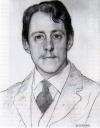Biography
Robert Laurence Binyon (10 August 1869 at Lancaster - 10 March 1943 at Reading, Berkshire) was an English poet, dramatist, and art scholar. His most famous work, For the Fallen, is well known for being used in Remembrance Sunday services.
Moved by the opening of the Great War and the already high number of casualties of the British Expeditionary Force, in 1914 Laurence Binyon wrote his For the Fallen, with its Ode of Remembrance, as he was visiting the cliffs of northern Cornwall (where a plaque commemorates it nowadays.) The piece was published by The Times newspaper in September, when public feeling was affected by the recent Battle of Marne.
Today Binyon is most famous for For the Fallen, often recited at Remembrance Sunday services in the UK, and an integral part of Anzac Day services in Australia and New Zealand, and November 11 Remembrance Day services in Canada. The third and fourth verses of the poem (although often just the fourth)have so been claimed as a tribute to all casualties of war, regardless of nation.
They went with songs to the battle, they were young.
Straight of limb, true of eyes, steady and aglow.
They were staunch to the end against odds uncounted,
They fell with their faces to the foe.
They shall grow not old, as we that are left grow old:
Age shall not weary them, nor the years condemn.
At the going down of the sun and in the morning,
We will remember them.
In 1915, despite being too old to enlist in the First World War, Laurence Binyon volunteered at a British hospital for French soldiers, Hopital Temporaire d'Arc-en-Barrois, Haute-Marne, France, working briefly as a hospital orderly. He returned in the summer of 1916 and took care of soldiers taken in from the Verdun battlefield. He wrote about his experiences in For Dauntless France (1918) and his poems, "Fetching the Wounded" and "The Distant Guns", were inspired by his hospital service in Arc-en-Barrois. ..






